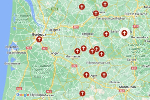News & Events
Dordogne
Gironde
Lot-et-Garonne / Gers
Information

Environment : Resources
Rev'd Liz Morris writes:
Environmental issues are increasingly in the news around the world and it is hoped that as a Chaplaincy, as churches within the Chaplaincy and as individuals, we will be finding ways to reduce our carbon footprint and taking our role as stewards of creation seriously. The Zoom Lent Course ‘Caring for creation’ has got many of us thinking about how to do that. Local committees and core teams have been given a questionnaire to fill in which will enable us to review what we do at the present and how we can improve on it.
caring for creationOver the coming months we will be developing an action plan and introducing ways to reduce our impact on the environment.
One thing we can all do is to work out our own carbon footprint by using one of the online websites (see below) and then make improvements to our own lifestyles.

Carbon calculators
Caring for creation is one of the things we need to be doing as Christians; God gave us a role in looking after his world; it is not there for us to exploit. We are all becoming aware of melting ice caps and rising water levels, shrinking rainforests and rising temperatures.
We have a beautiful world, but we are in danger of destroying so much of that beauty. Take a look around you at our amazing part of planet Earth and consider what kind of a world you want to pass on to future generations.
At this time of year, around here, we are especially aware of new life in creation. From seemingly bare ground spring cereals, plants, grasses and bracken; the trees are beginning to show green buds and frothy blossom and on a recent walk we spotted cowslip, false oxslip, marsh marigold, speedwell, dandelion, violet, snakehead fritillary, and several others flowers we were unable to name. The birdsong is amazing and I even heard an early hoopoe the other day!
In the northern hemisphere we are lucky to be able to use many of the metaphors of Spring when we speak of Easter and Jesus’ resurrection to new life. It brings to my mind the words of that Easter hymn: ‘Now the green blade riseth from the buried grain’. The third verse reads:
‘Forth he came at Easter, like the risen grain, he that for three days in the grave had lain; quick from the dead, my risen Lord is seen: Love is come again like wheat that springeth green.’
As the ancient Easter greeting goes ‘The Lord is risen’; ‘He is risen indeed’ Alleluia!
Without the resurrection, the cross would have been an unmitigated disaster. If Christ did not rise from death then the Christian faith is in vain.
Christ, who rose from the dead, is still alive today. Christians are risen with Christ. We can still walk with Christ on the road, we can still know him in the breaking of the bread. The resurrection is the guarantee that nothing can separate us from his love.
We have Jesus’ commandment ringing in our ears ‘Love God and love your neighbour as you love yourself’. If we love God we will want to love and care for our environment. The way we live affects the lives of people on the other side of the world whom we will never meet. Since our effect on the planet is global, our concerns also need to be global. If we are genuinely trying to follow Jesus, we cannot ignore the plight of those already severely affected by climate change for they are those neighbours that we are called to love.
May God bless you this Easter.
Elizabeth Morris
Green Christian monthly Prayer Guide
Ordinary Christians, extraordinary times!
Click below to visit the Green Christian website, and check out their very useful and informative Prayer Guide.

'A Rocha France' centre for environmental study courses

A Rocha France is part of A Rocha (see www.arocha.org), a worldwide environmental Christian organisation. One of their two sites is the Domaine des Courmettes, which is a private property of 600 hectares situated in the commune of Tourrettes-sur-Loup in the Alpes-Maritimes.
At over 800m and including the Pic de Courmettes (1248 m), the whole site is a nature reserve and provides outstanding views of the Côte d’Azur below. The heart of the estate is the old chateau which can welcome different sized groups for varied activities including raising awareness of environmental questions.
The courses aim to explore scientific and theological questions about creation in the stunning scenery of Les Courmettes. It’s a partnership between The Faraday Institute and A Rocha France, and will include lectures, study sessions, practical activities and guided excursions, plus plenty of time for relaxation and solitude.
Reduce plastic consumption during Lent!

Join the ‘Lent plastics challenge’ – and help make a positive change!
Over 8.3 billion tonnes of plastic have produced since the 1950s. If you are looking for ways to reduce your environmental impact why not join us in the Lent plastics challenge.
There is also a Facebook group – Plastic-less Lent 2018 where you can share your journey, tips, tools etc. with others trying to live more lightly.
Fasting for Climate Change: 1st day of each month
It’s been inspiring to read about the recent progress made during the Climate Change Conference in Paris, historic negotiations which have the potential to be a new dawn for the international effort to address climate change. From the pilgrimages, to worldwide marches and community level action, churches have been and continue to be a huge part in this movement. So inspiring!
People of faith have been fasting together on the first of every month. During the climate talks faith leaders and fasters gathered around a table set with empty plates. “It’s lunchtime, but we’re not eating! We’re fasting for climate justice, and for all countries to play their fair part in tackling climate change.”
Perhaps an idea for an additional Lent Challenge, to join with others to give one day per month for the climate?

Ecumenical Statement on the climate crisis

Religious leaders of France have spoken out together in support of the environment, stating that “the climate crisis is a spiritual and moral crisis.” They make an appeal for “an upsurge of awareness so as to act consistently in favour of the climate and to question our values and our attitudes.”







